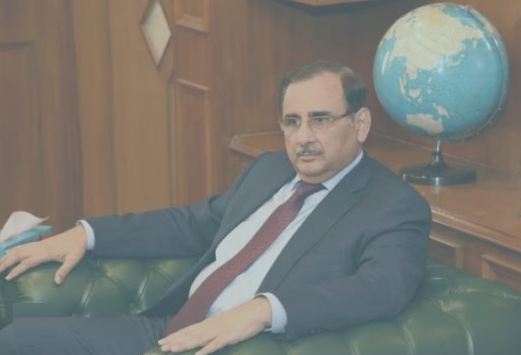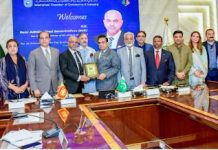Anjum Nisar believes $8bn target achievable if supported by bold, clear, and time-bound actions
ISLAMABAD, AUG 3 /DNA/ – The Federation of Pakistan Chambers of Commerce & Industry’s Businessmen Panel (BMP) has welcomed the announcement of an $8 billion annual trade target between Pakistan and Iran, calling it a step in the right direction for regional economic cooperation. However, it warned that such targets will remain only on paper unless both countries move swiftly to remove longstanding trade barriers, implement practical steps on the ground, and most importantly, complete the Iran-Pakistan gas pipeline project that has already suffered years of costly delay.
FPCCI former president and BMP Chairman Mian Anjum Nisar said that while the trade target reflects a positive political atmosphere and renewed interest in economic ties, the business community has witnessed many similar pledges in the past that failed to translate into real trade growth. He said the central problem is not the lack of interest but the presence of systemic bottlenecks, regulatory restrictions, security issues, and inadequate infrastructure at the border, which continue to choke potential trade despite close cultural and geographical proximity. He emphasized that the two countries have all the ingredients to become natural trade partners, but this potential will remain wasted unless both governments show seriousness in execution and build reliable commercial linkages beyond announcements.
He stated that one of the most crucial and unresolved elements is the incomplete gas pipeline project, which, if operationalized, could provide Pakistan with a stable and cost-effective source of energy while boosting bilateral trust and regional interdependence. He reminded that Iran has already completed the construction of its portion of the pipeline years ago, but Pakistan’s side remains frozen due to external pressure and internal indecision.
Anjum Nisar said it is no longer feasible to delay the project under the pretext of international sanctions, as energy insecurity in Pakistan has now reached a critical stage, requiring bold and independent decision-making.
The BMP chairman stressed that unless Pakistan finds a way to move forward with the gas pipeline, all talk of economic integration will remain hollow. He said the government must urgently engage in constructive diplomacy with international stakeholders to carve out a viable space for pipeline completion without breaching global obligations. He warned that further delay could lead to financial liabilities through arbitration proceedings already initiated by Iran, which could result in penalties running into billions of dollars. He said that economic sovereignty demands practical action, not just caution and postponement.
Mian Anjum Nisar pointed out that trade volumes between the two countries have remained disappointingly low for years, despite repeated expressions of interest from both sides. He said non-tariff barriers, lack of banking channels, absence of trade insurance, inconsistent customs policies, and severe border restrictions have made even basic trade difficult. He cited the example of border areas like Mashkhel, where legal trade has collapsed due to over-regulation and tight fencing, depriving thousands of people of livelihoods and pushing commerce into informal or smuggling routes. He said a country cannot boost regional trade if it suffocates its own border economy.
He said both countries should work on reactivating legal trade routes under strict but facilitative regulation, ensuring that cross-border movement of goods does not become hostage to political or bureaucratic roadblocks. He urged both sides to develop joint border terminals, improve road links, and modernize customs procedures to reduce delays and encourage licensed trade. He also called for the introduction of barter trade systems in permitted categories that could function without needing conventional banking links, which remain limited due to sanctions-related financial isolation.
Anjum Nisar further urged that beyond energy and border trade, there are vast opportunities in agriculture, pharmaceuticals, construction materials, and IT services that have not yet been explored seriously. He said the lack of market awareness, business-to-business contact, and promotional initiatives has kept Pakistani exporters largely disconnected from Iranian demand. He emphasized that trade offices, chambers of commerce, and private trade councils should be activated with dedicated staff to create an institutional bridge between Pakistani and Iranian businesses.
He said BMP strongly believes that the $8 billion target is achievable but only if supported by a series of bold, clear, and time-bound actions. He emphasized that announcements made at the top level should now be matched by technical and logistical work on the ground. He noted that the frequent change of governments, economic crises, and shifting regional dynamics often interrupt such initiatives, and that is why the private sector must be made a permanent stakeholder in any bilateral trade plan. He offered the full support of FPCCI’s BMP to facilitate sector-specific dialogue, organize trade exhibitions, and help solve practical challenges faced by exporters and importers on both sides.
He said Pakistan must take lessons from earlier failures and act with strategic clarity this time. He recalled that nearly every few years, similar trade targets have been set between the two countries but were never met. He said the only way to break this cycle is to start with concrete action—reviving cross-border trade, launching the gas pipeline, and streamlining trade regulations. Without these pillars, he said, the $8 billion figure would be no different than previous targets that faded away.

















